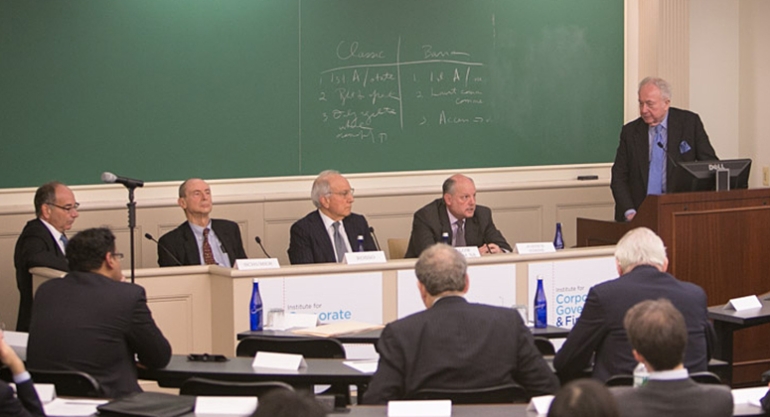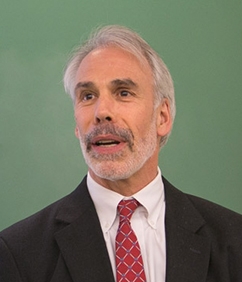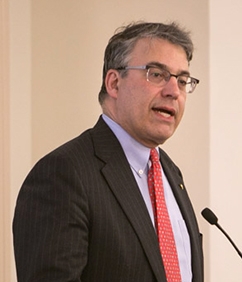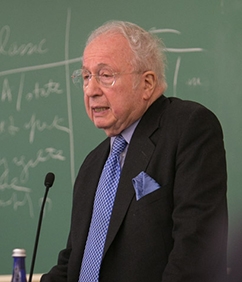Institute for Corporate Governance and Finance launch features Martin Lipton’s “New Paradigm for Corporate Governance”
At the launch of the Institute for Corporate Governance and Finance, a panel of leaders representing institutional investors, corporations, shareholders, and other stakeholders examined the “New Paradigm for Corporate Governance” proposed by Martin Lipton ’55, sparking a spirited conversation about the fundamental challenges of ensuring long-term economic prosperity.
In his welcoming remarks, Dean Trevor Morrison spoke about Lipton, who is a member of NYU Law’s Board of Trustees, and his continued commitment to the Law School: “No one has done more for this law school over 60-plus years than this man,” he said, “and his role in helping see to the launch of this institute is just one example. Our gratitude only grows.” The dean also spoke about the institute’s director, Professor of Law Edward Rock, whose illustrious career in corporate law and corporate governance allowed for the formation of an institute that intersects academia and practice and law and finance. “In addition to being a hugely distinguished academic, Ed is that rare person who can bridge the worlds of theory and practice.”
David Katz ’88, partner at Wachtell, Lipton, Rosen & Katz and adjunct professor at NYU Law, echoed Morrison’s sentiments and noted that because the new institute has access to many institutional investors, corporations, academics, and professionals, there is a unique opportunity to facilitate crucial corporate governance dialogues among investors. And since the institute’s flagship program will consist of roundtables conducted under the Chatham House Rule, Katz said that these key players will be able to “make progress in ways we haven’t been able to in the past.”
Rock introduced Lipton and his “New Paradigm for Corporate Governance,” putting it in the context of recent global political decisions. He noted that the old vision—that the goal of the corporation should be to maximize shareholder value—was not something voters of the world found compelling. “We have to come up with a new way of conceptualizing what corporate governance should be,” Rock said. “A new paradigm. And not how it compares to some ideal vision, but how it compares to politically plausible alternative ways of organizing what we do.”
Lipton, who co-founded Wachtell, Lipton, Rosen & Katz, invented the “poison pill” defense, and is considered by many to be a giant in corporate law, recently developed a corporate governance framework to resist “short-termism” and short-term attacks by financial activists that contradict long-term economic growth. Lipton first presented this framework, called the “New Paradigm,” in 2016 to the World Economic Forum’s International Business Council (IBC), which represents 100 of the largest companies in the world. The IBC members in attendance unanimously approved the framework.
“The ‘New Paradigm’ starts with the premise that its purpose is to promote long-term investment and to set parameters for the two principle players: the business corporation and the major institutional investors and asset managers,” said Lipton. Under his model, if a corporation and its board and management are pursuing well-conceived strategies, investors will support the company rather than financial activists looking for short-term gains.
Following Lipton’s presentation, Matthew Mallow ’67, LLM ’68, vice chairman of BlackRock, praised the “New Paradigm” for its efforts to improve corporate transparency and fiduciary duty. “Our fiduciary duty demands that we vote the shares and take views on corporate governance and other issues that come across a board’s plate,” Mallow said.
Bringing a global perspective to the discussion, Jean-Pierre Rosso, vice chairman of the World Economic Forum (WEF) USA, also commended Lipton’s framework and expanded upon it. “We see companies as responsible to their stakeholders, but also at large to society,” which means caring about issues such as the environment and health, said Rosso. The WEF, he added, is committed to the initiative and is developing an index to measure and report on “long-termism.”
The panel also included skeptics of Lipton’s paradigm. Robert Schumer, chair of the corporate department at Paul, Weiss, Rifkind, Wharton & Garrison, pointed out the prevalence of high-speed, short-term trading as an obstacle: “[Lipton’s] entire philosophy is based on longer-term investing, and it’s a good one. But it’s hard to see how that operates in light of how things actually trade. Can you do it without legislation and without tax reform?”
Chief Justice Leo Strine Jr., of the Delaware Supreme Court, was also a vocal critic, arguing that, while the “New Paradigm” was a nod in the right directions, fundamental problems were not being addressed. End investors have too little power, he argued, while money managers have “very little litigative accountability and very little accountability for performance over time.”
Lipton responded with an appeal to practicality. “In the long run, we need to redo it, but that happens only in a dream world. We’re not going to redo the whole structure. We have to take it step by step.”
Posted March 17, 2017





